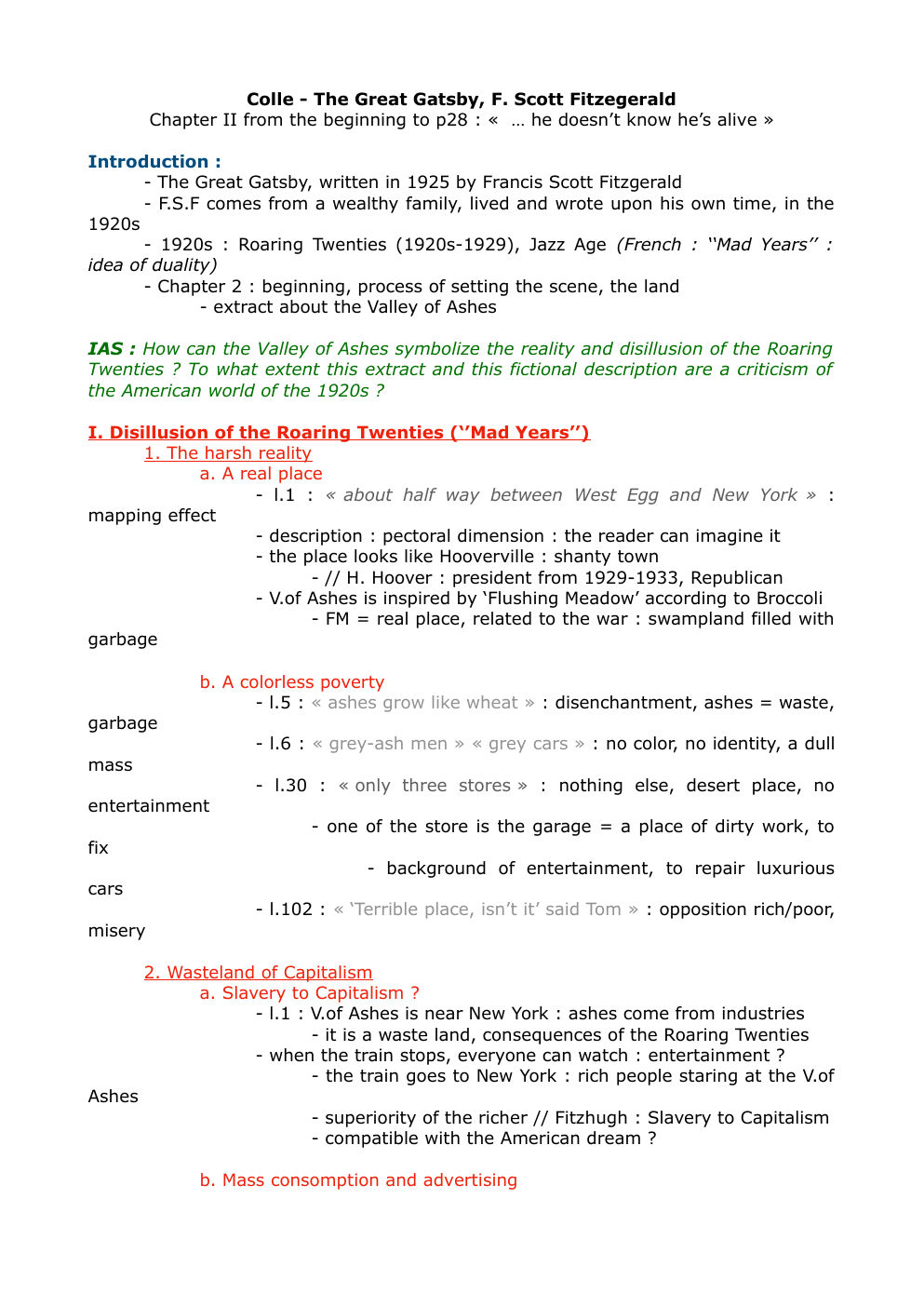Kholle - The Great Gatsby, F. Scott Fitzegerald - La Vallée des cendres - Gatsby
Publié le 27/07/2022

Extrait du document
«
Colle - The Great Gatsby, F.
Scott Fitzegerald
Chapter II from the beginning to p28 : « … he doesn’t know he’s alive »
Introduction :
- The Great Gatsby, written in 1925 by Francis Scott Fitzgerald
- F.S.F comes from a wealthy family, lived and wrote upon his own time, in the
1920s
- 1920s : Roaring Twenties (1920s-1929), Jazz Age (French : ‘‘Mad Years’’ :
idea of duality)
- Chapter 2 : beginning, process of setting the scene, the land
- extract about the Valley of Ashes
IAS : How can the Valley of Ashes symbolize the reality and disillusion of the Roaring
Twenties ? To what extent this extract and this fictional description are a criticism of
the American world of the 1920s ?
I.
Disillusion of the Roaring Twenties (‘’Mad Years’’)
1.
The harsh reality
a.
A real place
- l.1 : « about half way between West Egg and New York » :
mapping effect
- description : pectoral dimension : the reader can imagine it
- the place looks like Hooverville : shanty town
- // H.
Hoover : president from 1929-1933, Republican
- V.of Ashes is inspired by ‘Flushing Meadow’ according to Broccoli
- FM = real place, related to the war : swampland filled with
garbage
garbage
b.
A colorless poverty
- l.5 : « ashes grow like wheat » : disenchantment, ashes = waste,
- l.6 : « grey-ash men » « grey cars » : no color, no identity, a dull
mass
entertainment
fix
- one of the store is the garage = a place of dirty work, to
- background of entertainment, to repair luxurious
cars
misery
Ashes
- l.30 : « only three stores » : nothing else, desert place, no
- l.102 : « ‘Terrible place, isn’t it’ said Tom » : opposition rich/poor,
2.
Wasteland of Capitalism
a.
Slavery to Capitalism ?
- l.1 : V.of Ashes is near New York : ashes come from industries
- it is a waste land, consequences of the Roaring Twenties
- when the train stops, everyone can watch : entertainment ?
- the train goes to New York : rich people staring at the V.of
- superiority of the richer // Fitzhugh : Slavery to Capitalism
- compatible with the American dream ?
b.
Mass consomption and advertising
consumerism
superficiality
- advertising of T.J.
Eckleburg : world of mass consomption,
- eyes of T.J.
Eckleburg = symbol of meaninglessness,
- l.23 : the eyes are « dimmed a little by many paintless day »
- dull, faded : eyes = God ? -> absence of religion
- they forgot about it, they drank to excess, had sex …
- // Prohibition : 18th amendment, 1919 -> opposite effect :
excess
II.
An ill-fated world
1.
Doomed lives
a.
The eyes....
»
↓↓↓ APERÇU DU DOCUMENT ↓↓↓
Liens utiles
- QUELQUES AUTEURS ANGLOSAXONS A connaître US Francis Scott Fitzgerald The Great Gatsby.
- Essay The great Gatsby/bluest eye
- The Great Gatsby chapter VII
- Scott Fitzgerald et Gatsby
- Le personnage de GATSBY Francis Scott Fitzgerald









